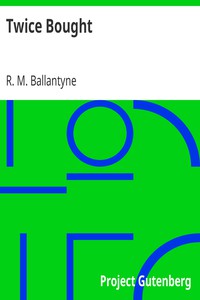Twice Bought, R. M. Ballantyne [ready to read books txt] 📗

- Author: R. M. Ballantyne
Book online «Twice Bought, R. M. Ballantyne [ready to read books txt] 📗». Author R. M. Ballantyne
“May I speak with the prisoner for a few minutes?” said Fred Westly to Gashford, as they plodded through the woods. “He has been my comrade for several years, and I promised his poor mother never to forsake him. May I, Gashford?”
“No,” was the sharp reply, and then, as if relenting, “Well, yes, you may; but be brief, and no underhand dealing, mind, for if you attempt to help him you shall be a dead man the next moment, as sure as I’m a living one. An’ you needn’t be too soft, Westly,” he added, with a cynical smile. “Your chum has— Well, it’s no business o’ mine. You can go to him.”
Poor Tom Brixton started as his old friend went up to him, and then hung his head.
“Dear Tom,” said Fred, in a low voice, “don’t give way to despair. With God all things are possible, and even if your life is to be forfeited, it is not too late to save the soul, for Jesus is able and willing to save to the uttermost. But I want to comfort you with the assurance that I will spare no effort to save you. Many of the diggers are not very anxious that you should bear the extreme punishment of the law, and I think Gashford may be bought over. If so, I need not tell you that my little private store hidden away under the pine-tree—”
“There is no such store, Fred,” interrupted Tom, with a haggard look of shame.
“What do you mean, Tom?”
“I mean that I gambled it all away unknown to you. Oh! Fred, you do not—you cannot know what a fearful temptation gambling is when given way to, especially when backed by drink. No, it’s of no use your trying to comfort me. I do believe, now, that I deserve to die.”
“Whatever you deserve, Tom, it is my business to save you, if I can—both body and soul; and what you now tell me does not alter my intentions or my hopes. By the way, does Gashford know about this?”
“Yes, he knows that I have taken your money.”
“And that’s the reason,” said Gashford himself, coming up at the moment, “that I advised you not to be too soft on your chum, for he’s a bad lot altogether.”
“Is the man who knows of a crime, and connives at it, and does not reveal it, a much better ‘lot’?” demanded Fred, with some indignation.
“Perhaps not,” replied Gashford, with a short laugh; “but as I never set up for a good lot, you see, there’s no need to discuss the subject. Now, fall to the rear, my young blade. Remember that I’m in command of this party, and you know, or ought to know, that I suffer no insolence in those under me.”
Poor Fred fell back at once, bitterly regretting that he had spoken out, and thus injured to some extent his influence with the only man who had the power to aid his condemned friend.
It was near sunset when they reached Pine Tree Diggings. Tom Brixton was thrust into a strong blockhouse, used chiefly as a powder magazine, but sometimes as a prison, the key of which was kept on that occasion in Gashford’s pocket, while a trusty sentinel paced before the door.
That night Fred Westly sat in his tent, the personification of despair. True, he had not failed all along to lay his friend’s case before God, and, up to this point, strong hope had sustained him; but now, the only means by which he had trusted to accomplish his end were gone. The hidden hoard, on which he had counted too much, had been taken and lost by the very man he wished to save, and the weakness of his own faith was revealed by the disappearance of the gold—for he had almost forgotten that the Almighty can provide means at any time and in all circumstances.
Fred would not allow himself for a moment to think that Tom had stolen his gold. He only took it for a time, with the full intention of refunding it when better times should come. On this point Fred’s style of reasoning was in exact accord with that of his unhappy friend. Tom never for a moment regarded the misappropriation of the gold as a theft. Oh no! it was merely an appropriated loan—a temporary accommodation. It would be interesting, perhaps appalling, to know how many thousands of criminal careers have been begun in this way!
“Now, Mister Westly,” said Flinders, entering the tent in haste, “what’s to be done? It’s quite clear that Mister Tom’s not to be hanged, for there’s two or three of us’ll commit murder before that happens; but I’ve bin soundin’ the boys, an’ I’m afeared there’s a lot o’ the worst wans that’ll be glad to see him scragged, an’ there’s a lot as won’t risk their own necks to save him, an’ what betune the wan an’ the other, them that’ll fight for him are a small minority—so, again I say, what’s to be done?”
Patrick Flinders’s usually jovial face had by that time become almost as long and lugubrious as that of Westly.
“I don’t know,” returned Fred, shaking his head.
“My one plan, on which I had been founding much hope, is upset. Listen. It was this. I have been saving a good deal of my gold for a long time past and hiding it away secretly, so as to have something to fall back upon when poor Tom had gambled away all his means. This hoard of mine amounted, I should think, to something like five hundred pounds. I meant to have offered it to Gashford for the key of the prison, and for his silence, while we enabled Tom once more to escape. But this money has, without my knowledge, been taken away and—”
“Stolen, you mean!” exclaimed Flinders, in surprise.
“No, not stolen—taken! I can’t explain just now. It’s enough to know that it is gone, and that my plan is thus overturned.”
“D’ee think Gashford would let him out for that?” asked the Irishman, anxiously.
“I think so; but, after all, I’m almost glad that the money’s gone, for I can’t help feeling that this way of enticing Gashford to do a thing, as it were slily, is underhand. It is a kind of bribery.”
“Faix, then, it’s not c’ruption anyhow, for the baste is as c’rupt as he can be already. An’, sure, wouldn’t it just be bribin’ a blackguard not to commit murther?”
“I don’t know, Pat. It is a horrible position to be placed in. Poor, poor Tom!”
“Have ye had supper?” asked Flinders, quickly.
“No—I cannot eat.”
“Cook it then, an’ don’t be selfish. Other people can ait, though ye can’t. It’ll kape yer mind employed—an I’ll want somethin’ to cheer me up whin I come back.”
Pat Flinders left the tent abruptly, and poor Fred went about the preparation of supper in a half mechanical way, wondering what his comrade meant by his strange conduct.
Pat’s meaning was soon made plain, that night, to a dozen or so of his friends, whom he visited personally and induced to accompany him to a sequestered dell in an out-of-the-way thicket where the moonbeams struggled through the branches and drew a lovely pale-blue pattern on the green-sward.
“My frinds,” he said, in a low, mysterious voice, “I know that ivery mother’s son of ye is ready to fight for poor Tom Brixton to-morrow, if the wust comes to the wust. Now, it has occurred to my chum Westly an’ me, that it would be better, safer, and surer to buy him up, than to fight for him, an’ as I know some o’ you fellers has dug up more goold than you knows well what to do wid, an’ you’ve all got liberal hearts—lastewise ye should have, if ye haven’t—I propose, an’ second the resolootion, that we make up some five hundred pounds betune us, an’ presint it to Bully Gashford as a mark of our estaim—if he’ll on’y give us up the kay o’ the prison, put Patrick Flinders, Esquire, sintry over it, an’ then go to slape till breakfast-time tomorry mornin’.”
This plan was at once agreed to, for five hundred pounds was not a large sum to be made up by men who—some of them at least—had nearly made “their pile”—by which they meant their fortune, while the liberality of heart with which they had been credited was not wanting. Having settled a few details, this singular meeting broke up, and Patrick Flinders—acting as the secretary, treasurer, and executive committee—went off, with a bag of golden nuggets and unbounded self-confidence, to transact the business.
Gashford was not quite so ready to accept Flinders’s offer as that enthusiast had expected. The bully seemed to be in a strangely unusual mood, too—a mood which at first the Irishman thought favourable to his cause.
“Sit down,” said Gashford, with less gruffness than usual, when his visitor entered his hut. “What d’ye want wi’ me?”
Flinders addressed himself at once to the subject of his mission, and became quite eloquent as he touched on the grandeur of the sum offered, the liberality of the offerers, and the ease with which the whole thing might be accomplished. A very faint smile rested on Gashford’s face as he proceeded, but by no other sign did he betray his thoughts until his petitioner had concluded.
“So you want to buy him off?” said Gashford, the smile expanding to a broad grin.
“If yer honour had bin born a judge an’ sot on the bench since iver ye was a small spalpeen, ye couldn’t have hit it off more nately. That’s just what we want—to buy him off. It’s a purty little commercial transaction—a man’s life for five hundred pound; an’, sure it’s a good price to give too, consitherin’ how poor we all are, an what a dale o’ sweatin’ work we’ve got to do to git the goold.”
“But suppose I won’t sell,” said Gashford, “what then?”
“Fair, then, I’ll blow your brains out” thought the Irishman, his fingers tingling with a desire to grasp the loaded revolver that lay in his pocket, but he had the wisdom to restrain himself and to say, “Och! sor, sure ye’ll niver refuse such a nat’ral request. An’ we don’t ask ye to help us. Only to hand me the kay o’ the prison, remove the sintry, an’ then go quietly to yer bed wid five hundred pound in goold benathe yar hid to drame on.”
To add weight to his proposal he drew forth the bag of nuggets from one of his capacious coat pockets and held it up to view.
“It’s not enough,” said Gashford, with a stern gruffness of tone and look which sank the petitioner’s hopes below zero.
“Ah! then, Muster Gashford,” said Flinders, with the deepest pathos, “it’s yer own mother would plade wid ye for the poor boy’s life, av she was here—think o’ that. Sure he’s young and inexparienced, an’ it’s the first offince he’s iver committed—”
“No, not the first” interrupted Gashford.
“The first that I knows on,” returned Flinders.
“Tell me—does Westly know of this proposal of yours?”
“No sor, he doesn’t.”
“Ah, I thought not. With his religious notions, it would be difficult for him to join in an attempt to bribe me to stop the course of justice.”
“Well, sor, you’re not far wrong, for Muster Westly had bin havin’ a sort o’ tussle wid his conscience on that very pint.





Comments (0)